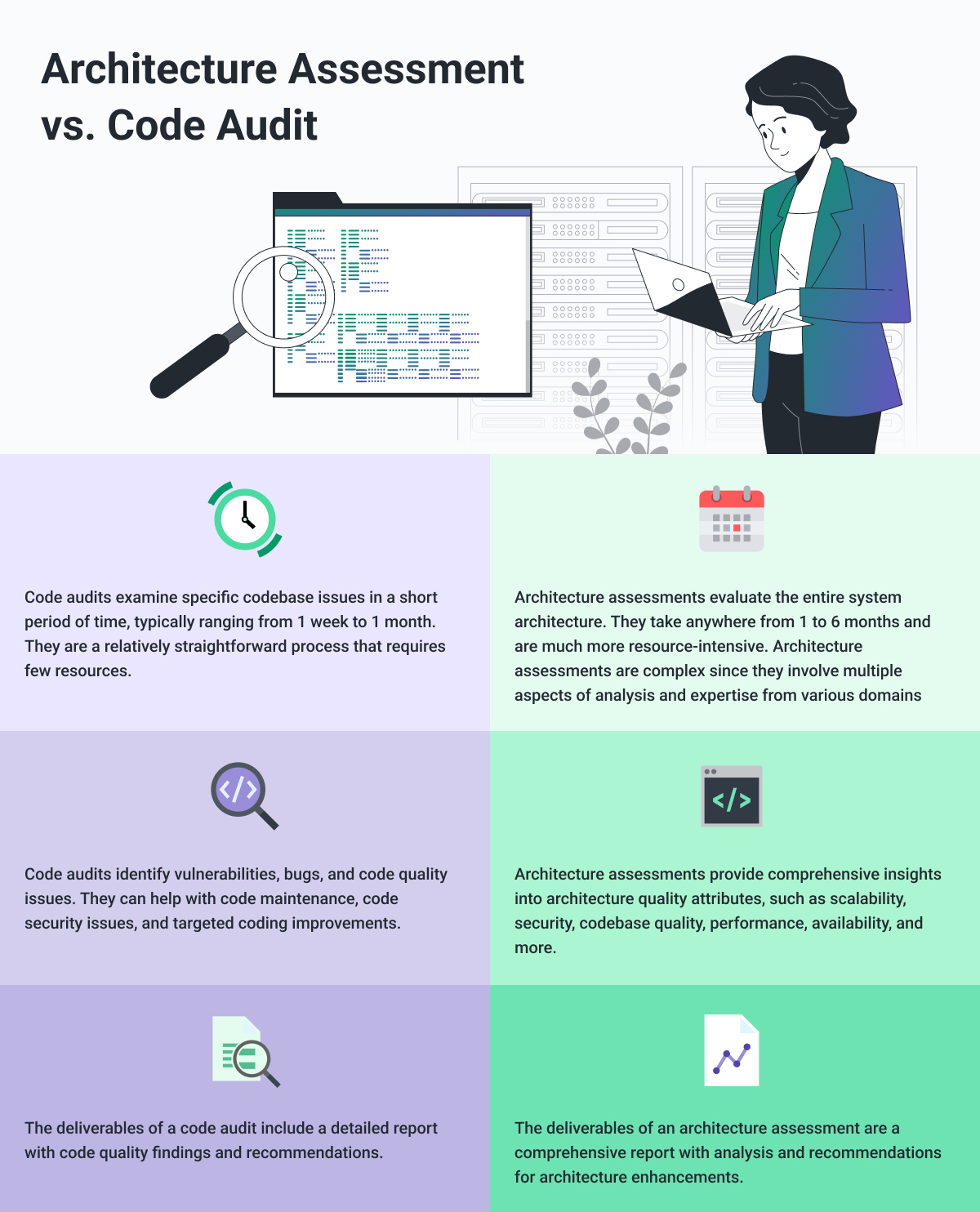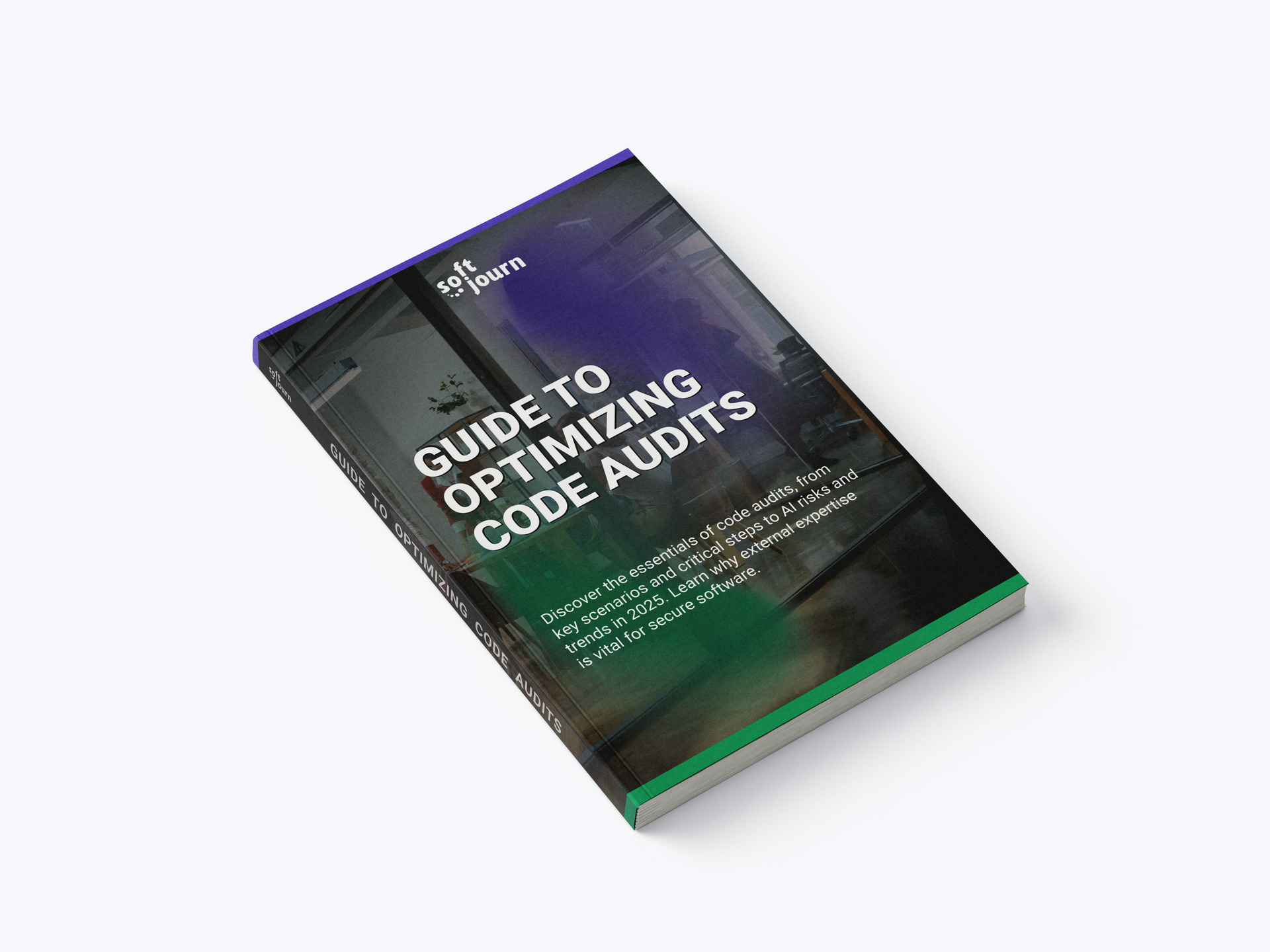In the ever-evolving landscape of software development, maintaining code quality is crucial to ensuring the longevity and efficiency of your applications. One effective way to achieve this is through a comprehensive code audit.
A code audit is a meticulous examination of a software codebase to assess its overall quality, structure, and adherence to best practices.
In this article, we will dive into the intricacies of the code audit process, how it differs from a comprehensive architecture assessment, its pros and cons, the timeline and team composition, and how Softjourn can help conduct a quick code audit.
Code Audit vs. Comprehensive Architecture Assessment
Before delving into the code audit process, it's essential to distinguish it from a comprehensive architecture assessment. While both serve to improve software quality, they differ in scope and focus.
A code audit primarily focuses on the codebase itself. It evaluates aspects such as maintainability, modularity, and code quality. The primary goal is to identify areas that may require refactoring or improvement. Code audits are valuable for pinpointing coding issues and inefficiencies within a specific software component.
On the other hand, a comprehensive architecture assessment takes a broader perspective. It assesses the entire software system, focusing on its architectural design, scalability, security, and overall quality attributes.
This type of assessment is ideal for ensuring that the entire system meets performance and scalability requirements, making it more suitable for large-scale applications.

Pros of a Code Audit
Short Timeline
One of the significant advantages of a code audit is its relatively short timeline. Depending on factors like codebase size and documentation availability, a code audit can be completed in as little as one week. This makes it a swift and efficient way to identify critical issues.
Fewer Resources Needed
Compared to a comprehensive architecture assessment, a code audit requires fewer resources. This means lower costs and less disruption to ongoing development projects.
Identifies Major Issues
A code audit is highly effective at identifying major code issues, including coding standards violations, code smells, and architectural deficiencies. This allows for targeted improvements that can significantly enhance code quality.

Cons of a Code Audit
Potential to Miss Software Issues
Due to its limited scope, a code audit may miss certain system-wide issues that a comprehensive assessment would catch. This includes scalability problems, security vulnerabilities, and architectural flaws that transcend individual code components.
Limited Scope
A code audit focuses solely on the codebase, leaving out other crucial aspects of software quality assessment, such as system architecture, scalability, and security.
Inability to Evaluate System Quality Attributes
Code audits are ill-suited for evaluating system-level quality attributes like scalability, security, and performance. These aspects require a more comprehensive approach.
Timeline and Team Composition
The timeline and team composition for a code audit can vary depending on the complexity of the project. Here's a rough outline:
Timeline
For a small codebase with good documentation and readily available code owners, a code audit can be completed in as little as one week.
For larger codebases with multiple technologies, reverse-engineering requirements, and limited documentation, it may take up to four weeks.
Team Composition
When you receive a quick code audit from Softjourn, our code audit expert team typically consists of the following:
- Solution Architect: Responsible for overseeing the audit and providing architectural insights.
- Business Analyst: Gathers information about the business model and user flows.
- Project Manager: Manages the audit process and ensures timely completion.
- Senior Developers: Conduct the code audit and provide technical expertise.

The Code Audit Process
The code audit process involves several crucial steps:
1. Gathering Information
- Conduct interviews with key stakeholders.
- Understand the business model and user flows.
- Identify typical pain points.
2. Code Audit
- Set up the application locally by cloning the code repository.
- Explore the application by going through major user flows.
- Get familiar with the codebase through a high-level review.
- Analyze the repository, including branching models, git history, contributors, and technologies used.
- Review documentation, code-level documentation, and onboarding materials for new developers.
- Assess the testing process, including unit tests, e2e tests, and their quality and coverage.
- Analyze tooling, such as the build process, static code analysis, and environment-specific configurations.
- Review 3rd-party dependencies, identifying outdated, unused, unmaintained, or vulnerable dependencies and license issues.
- Evaluate code quality against industry standards and best practices, including code structure, maintainability, and overall quality. Identify code smells, duplicate code, and unnecessary complexity.
- Check the quality of comments, coding standards, conventions, and consistency.
- Ensure proper handling of errors and exceptions, as well as input validation and sanitization.
3. Prepare and Present the Report
- Summarize the findings, highlighting key issues and recommendations.
Our Quick Code Audit Services
Softjourn specializes in providing top-notch Code Audit Services. Our team of experts is well-equipped to conduct quick code audits, helping you uncover critical issues in your codebase swiftly. With our efficient process and experienced team, you can expect a thorough evaluation and actionable recommendations to improve your software quality.
Beyond code audits, we also offer Comprehensive Architecture Assessments, Startup Audit Services, Technology Audit Services, and QA (Quality Assurance) Audits to help guide you no matter what you're looking to improve.

Final Word
A code audit is a valuable tool for maintaining and improving software quality. While it has its limitations, the ability of a code audit to quickly identify major code issues makes it an essential step in any software development lifecycle.
Whether you're looking to address specific a coding or compliance challenge or ensure a business opportunity is seamless, a code audit can provide the insights you need to succeed.















